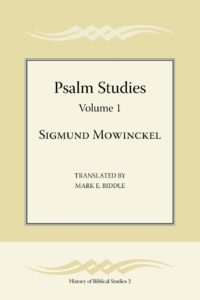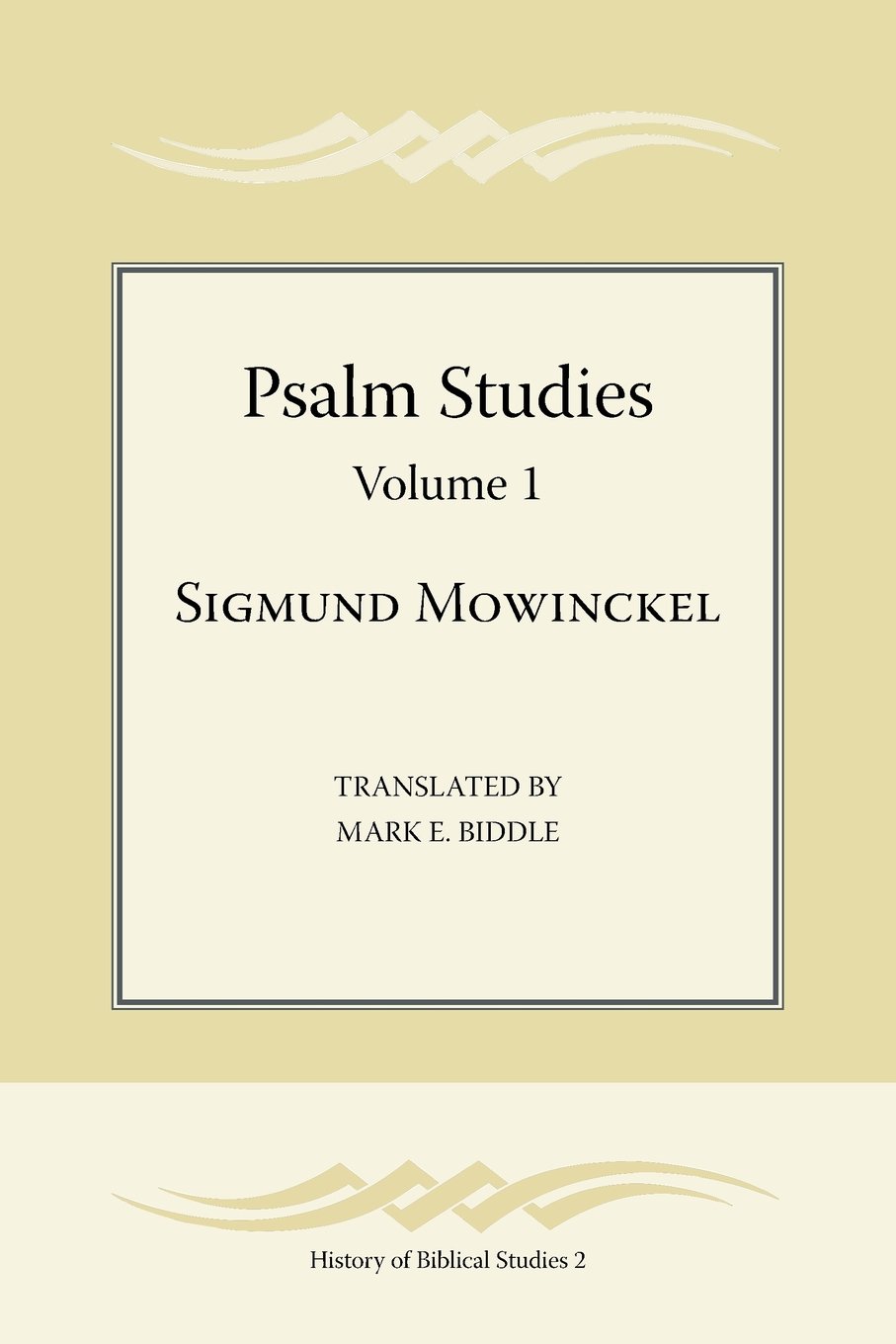 Psalm Studies, by Sigmund Mowinckel. Translated by Mark E. Biddle (SBL, 2014), 2 vols.
Psalm Studies, by Sigmund Mowinckel. Translated by Mark E. Biddle (SBL, 2014), 2 vols.
It’s surprising it took this long for Sigmund Mowinckel’s Psalm Studies to venture their way into the English language. These six studies were published in two volumes in 1921-1924. They were foundational to Mowinckel’s approach to the psalms, which then dominated psalms studies for the next 70 years. His Psalms in Israel’s Worship was published in 1962 and summarized all his previous work on the psalms. It was translated into English in 2004 by James Crenshaw. But much of that work assumed or referred to lengthier discussions in Psalm Studies. For that reason, it’s surprising it hadn’t been translated yet. While one could always consult the original German, we can now thank Mark Biddle for saving us a lot of time trying to read Mowinckel’s German.
Until the 1920s, the psalms were generally ignored by critical scholars and considered a random assortment of hymns from the second temple period (they were generally dated very late). Gunkel’s form-criticism brought life to academic study of the Psalter, although he still dated most of the psalms as post-exilic.
Sigmund Mowinckel was Gunkel’s student and absorbed his passion for the psalms. While Gunkel dated the psalms late and focused on their use as individual portraits of piety, Mowinckel dated most of them as pre-exilic and argued that the Sitz im Leben of most of the psalms was Israel’s cult. His second distinct contribution was his theory of the New Year’s “Enthronement of Yahweh” festival. The six studies in these two volumes are foundational for Mowinckel’s argumentation to support these two contributions.
The Contents
The first study examines the awen and the psalms of individual lament. The second study is the full study on the Enthronement of Yahweh festival. If there is one study to read by Mowinckel, it is this one, as it’s foundational for much of what he did with the psalms, and because some even today still defend his thesis.
Volume two contains the last four studies: (3) cultic prophecy and prophetic psalms; (4) the technical terms in the psalm superscriptions; (5) blessing and curse in Israel’s cult and psalmody; (6) the psalmists. As you can tell from the titles of the studies, Mowinckel sought to explicate many of the historical questions we have about the psalms: who wrote them? For what did they write them? What do the superscriptions mean? How were they used in worship?
While Mowinckel makes many questionable assumptions and depends much on historical conjecture (sometimes with little evidence), his approach it laudable. He desires to understand the psalter as a collection of songs and rituals used in ancient Israel’s worship. So the studies are still valuable today, even a century after he wrote them.
The Translation
Mowinckel has short book on Psalm 68 in which I first encountered his German (it has not been translated into English, to my chagrin, as I write my dissertation on Psalm 68). German was not his first language, being a Norwegian who, according to Biddle, “professed discomfort with the German language and German culture in general” (xi). In his work on Psalm 68, he includes many references to Norwegian folklore, as he does also in Psalm Studies. Needless to say, trying to translate rough German with foreign cultural references makes a tiresome task.
I was more than pleased to read Mowinckel through Biddel’s pen. The text flows well with a somewhat informal academic style that approaches conversational at points. Part of that is to be attributed to Mowinckel, and part of it to Biddle. He had a difficult task of translating some rough German and he has produced a magnificent translation that will serve scholars for years to come.
Its Value
Some might wonder if such an old work is worth buying and reading. Much of scholarship has moved beyond reading the psalms in isolation to read them as part of a narrative, guided by the Psalter’s editors as they arranged the psalms and smaller collections.
But Mowinckel is still relevant for two reasons. First, his work was a step toward the canonical approach. The canonical approach (e.g., Childs) still builds on critical scholarship, including Mowinckel’s in the psalms. Second, the canonical approach is not necessarily a better approach. For reasons I cannot elaborate on here, I much prefer Mowinckel’s approach to the psalms as individual compositions to be used in Israel’s worship, with their meaning and use connected to their original purpose. The canonical approach to the Psalter can tell us some things about second-temple Jewish Psalter redactors and their beliefs, but I’m hesitant to elevate these beliefs to the same level of importance (or even relevance) as the original composers and users of the psalms.
And so, Mowinckel is still relevant, because he shared in that quest for the historical circumstances of the psalms’ composition and use, even if he may have used different assumptions than we ourselves might hold. In sum, many thanks to Mark Biddle for this laborious project from which we may all now benefit!
Preview or buy it here.


